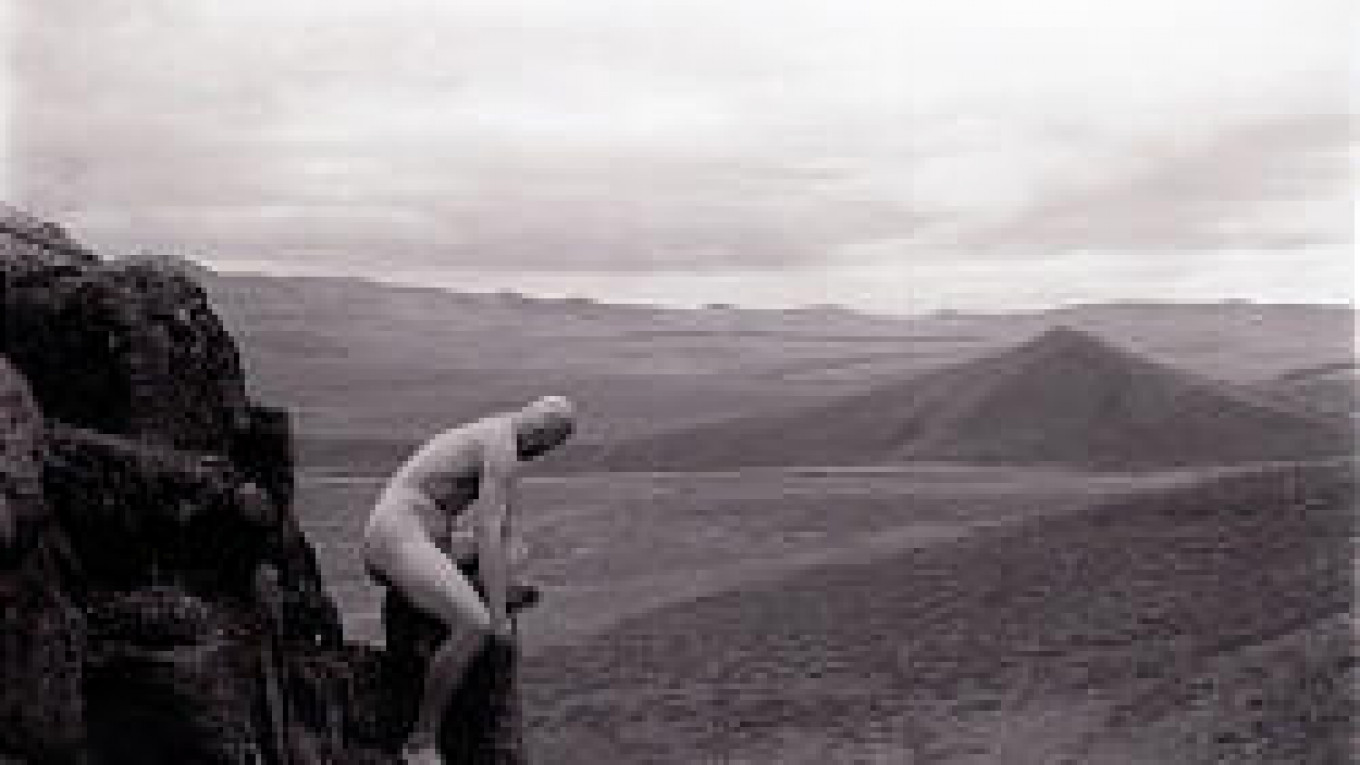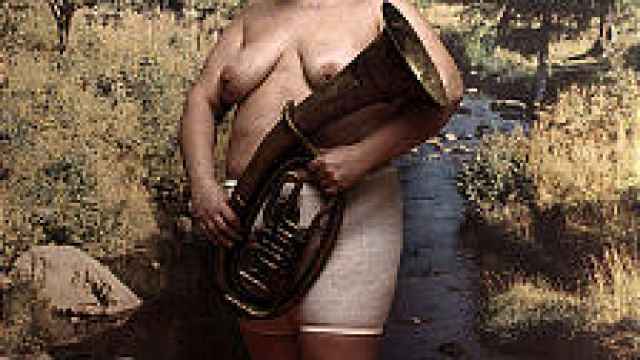Photobiennale organizers scoured the whole of Russia to compile this extraordinary medley of work. Indeed, five of the nine "Body and the Art of Movement" participants are non-Muscovites, a tribute to the energy of Olga Sviblova, director of the Moscow House of Photography, which organizes the festival.
The fact that this festival division contains so many nudes is not insignificant: Josef Stalin banned nude photography in 1935 and it remained a censored art form until the 1990s.
"This show proves that it [nude photography] is not a lost genre in Russia," Sviblova said. "While in the West, photographers have been able to show and publish their work, Russians have been producing these photographers in secret."
Sergei Chilikov from Ioshkar-Ola in northeastern Russia made the most controversial contribution to the show with his "Peasant Glamour" (Derevyansky Glamor) series of photographs of a middle-aged mother of four who single-handedly runs a dairy farm. The woman, a friend of the artist, performs a strip tease for the camera, and is naked by the third photograph. The rest of the series features her posing, with hairy legs and weather-beaten face, in a variety of provocative poses.
"I always take nudes," shrugged Chilikov, an unglamorous figure known for his love of drink. "She took off her clothes of her own accord. My models always do.
"The pictures are completely natural; I don't use a tripod. And the model herself is natural, an earth mother who spends all day with her children and her cows."
Loud accusations aimed at Chilikov of "pornographer!" that came about halfway through the opening, however, were misguided. His model's face shows no signs of affected ecstasy or attempted seduction. She simply gazes at the camera, allowing the contrast of her lined face and white, delicate flesh to speak for itself.
|
Stanislav Yavorsky Stanislav Yavorsky's "Red Series" features shots of heavy women in a varied poses. |
Chilikov tells of a recent Moscow House of Photography banquet, during which he left the hall for the restroom and ended up wandering onto the street, where he met a stripper and asked her to pose for him. The guests later left the dinner to find Chilikov photographing the naked woman in the building's hallway. Likewise, he recalls a female tax inspector who called on him a few months ago and within minutes found herself the subject of a naked photo session that went on for 10 hours.
Nudity dominated "Body and the Art of Movement," most strikingly in the photographs of avant-garde performance artist German Vinogradov, which feature Vinogradov stripped of his usual multicolored garb, his body draped over the crags of a deserted plain in Buryatia. Dressed in elaborate robes at the opening of this week's show with a blue rubber lizard hanging from his beard, Vinogradov is a walking work of art. His ego, however, is absent from this series, which carries the nonsense title "Mtsyri. Y-Kratkaya" and illustrates the smallness of man relative to the vastness of the landscape.
But such solemn themes have little in common with the French Horn-bearing semi-naked fat women of Stanislav Yavorsky's "Red Series" (Krasnaya Seriya). An admirer of large-sized women, Yavorsky's female subjects leap joyously into the air clutching a bunch of balloons; or they weep, flaccid breasts bared, their heads fitted out in clownish bonnets.
Roman Bobotov's glossy close-ups of the body manage to make even a hairy mole a thing of beauty, while Svyatoslav Ponomaryov's "Opportunity for Transformation. Facing Eternity" (Vozmozhnost Transformatsii. Litsom k Beskonechnosti), a series of women's backs illuminated with projections of Indian and Burmese imagery, may not inspire the meditations on infinity it intends, but its content is nevertheless graceful and well-crafted.
Finally, fashionable photographer Georgy Ostretsov takes a more lateral approach to the show's theme. Fascinated by the idea of security cameras, his contribution is a series of video stills designed to look like they were taken by a security camera in a restaurant kitchen. The series, titled "Bulimia," tells the story of a man's nighttime kitchen raid, during which he devours an entire cake.
Ostretsov, who cites Alfred Hitchcock as his inspiration, said, "I love this world. Real violence is absent -- there is only the suggestion of it."
With its self-portraits, human imperfection and surveillance cameras, "Body and the Art of Movement" manages to provide an insightful overview of the contemporary photographic scene in Russia, ensuring that every visitor finds something of interest, whether he prefers the nocturnal glutton, the naked dairy farmer or the otherwise outrageous performance artist alone with the desert.
"Body and the Art of Movement" (Telo i Iskusstvo Dvizheniya) runs to April 28 at the Photo Center, located at 8 Gogolevsky Bulvar. Metro Kropotkinskaya. Tel. 290-6996, 291-8602. For a complete schedule of Photobiennale exhibits, see this week's events calendar.
A Message from The Moscow Times:
Dear readers,
We are facing unprecedented challenges. Russia's Prosecutor General's Office has designated The Moscow Times as an "undesirable" organization, criminalizing our work and putting our staff at risk of prosecution. This follows our earlier unjust labeling as a "foreign agent."
These actions are direct attempts to silence independent journalism in Russia. The authorities claim our work "discredits the decisions of the Russian leadership." We see things differently: we strive to provide accurate, unbiased reporting on Russia.
We, the journalists of The Moscow Times, refuse to be silenced. But to continue our work, we need your help.
Your support, no matter how small, makes a world of difference. If you can, please support us monthly starting from just $2. It's quick to set up, and every contribution makes a significant impact.
By supporting The Moscow Times, you're defending open, independent journalism in the face of repression. Thank you for standing with us.
Remind me later.



